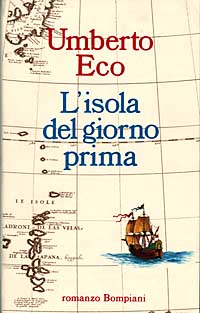The Island of the Day Before
 First edition (Italian) | |
| Author | Umberto Eco |
|---|---|
| Original title | L’isola del giorno prima |
| Translator | William Weaver |
| Language | Italian |
| Publisher | Secker & Warburg (UK) Harcourt (US) |
Publication date | 1994 |
| Publication place | Italy |
Published in English | 1995 |
| Media type | Print (Hardback & Paperback) |
| Pages | 513 pp |
| ISBN | 0-436-20270-0 (UK) 0151001510 (US) |
| OCLC | 33328715 |
The Island of the Day Before (Template:Lang-it) is a historical fiction novel by Umberto Eco set in the 17th-century during the historical search for the secret of longitude.[1] The central character is Roberto della Griva, an Italian nobleman marooned on a deserted ship in the Pacific Ocean, and his slowly decaying mental state, in a backdrop of Baroque-era science, metaphysics, and cosmology.
Plot summary
Roberto della Griva, a 17th-century Italian nobleman, is the sole survivor of a shipwreck during a fierce storm. He finds himself washed up on an abandoned ship in a harbour through which, he convinces himself, runs the International Date Line (roughly 180° longitude). Although he can see land, his inability to swim leaves him marooned and he begins to reminisce about his life and his love. He becomes obsessed about his allegedly evil twin brother, who is split from his own persona through a process reminiscent of the doppelganger effect, and thus accusing him of all the bad things that happened in his life. The brother takes blame mainly for his bad choices and is present to sweeten the disappointments of life. Through this reminiscence he becomes convinced that all his troubles will end, if only he can reach the land. The story is told from the point of view of a modern editor who has sorted through the man's papers. Exactly how the papers were preserved and eventually handed down to the editor remains a point of conjecture.
This work contains references to Eco's previous novels. In one example, there is a mention of a crucial plot point from Eco's first novel The Name of the Rose.
References
- ^ Warner, Marina (December 17, 1995). "Inside the Big Mind : Umberto Eco's dazzling blend of science and fantasy comes perilously close to pedagogy". LA Times.
